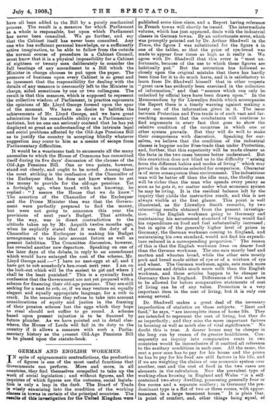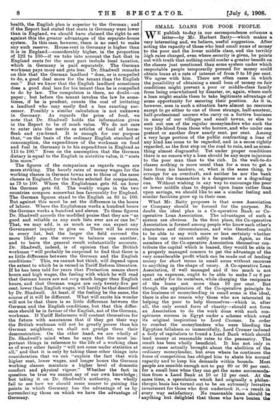GERMAN AND ENGLISH WORKMEN.
IN spite of epigrammatic contradictions, the production of figures is one of the most useful functions that Governments can perform. More and more, in all countries, they find themselves compelled to take up the work of social legislation ; and without figures, and the inquiries of which figures are the outcome, social legisla- tion is only a leap in the dark. The Board of Trade is wisely examining into the condition of the working classes in towns in certain of the principal countries. The results of this investigation for the United Kingdom were published some time since, and a Report having reference to French towns will shortly be issued. The intermediate volume, which has just appeared, deals with the industrial classes in German towns. By an unfortunate error, which was promptly pointed out by Dr. Arthur Shadwell in the Times, the figure I was substituted for the figure 4 in one of the tables, so that the price of rye-bread was made to appear four times as high as it really is. We agree with Dr. Shadwell that this error is "most un- fortunate, because of the use to which these figures are habitually put." But the correction has followed so closely upon the original mistake that there has hardly been time for it to do much harm, and it is satisfactory to learn from Dr. Shadwell himself that in other respects "great care has evidently been exercised in the collection of information," and that "sources which can only be unlocked by official keys have been drawn upon." In the Memorandum by Sir Llewellyn Smith which accompanies the Report there is a timely warning against making a hasty use of the information given in it. The issue between Protection and Free-trade is of such vast and far- reaching moment that the combatants will continue to find arguments in every fact that goes to show the relative condition of the countries in which one or other system prevails. But they will do well to make their comparisons with discretion. Speaking for our- selves, we believe that the condition of the industrial classes is happier under Free-trade than under Protection, and, further, that this superiority will be made clearer as the facts in the two cases become better understood. But this conviction does not blind us to the difficulty "arising from the different habits and modes of living" which may prevail in the countries selected for comparison. Character is of more consequence than environment. The industrious man will be better off than the idle man, the thrifty man will be richer than the man who spends every penny as soon as he gets it, no matter under what economic system he may be living. It is the residual balance left by the inquiry that yields the instructive result, and this is not always visible at the first glance. This point is well illustrated, as Sir Llewellyn Smith remarks, by two interesting results obtained from the present investiga- tion. "The English workman going to Germany and maintaining his accustomed standard of living would find his expenditure on food and fuel substantially increased ; but in spite of the generally higher level of prices in Germany, the German workman coming to England, and maintaining his own standard, would not find his expendi- ture reduced in a corresponding proportion." The reason of this is that the English workman lives on dearer food than the German workman. The one eats mostly beef and mutton and wheaten bread, while the other eats mostly pork and bread made either of rye or of a mixture of rye and wheat. The German workman, again, eats much more of potatoes and drinks much more milk than the English workman, and these articles happen to be cheaper in Germany than in England. Differences of this sort have to be allowed for before comparative statements of cost of living can be of any value. Protection is a very important item in the cost of living, but it is only one among several.
Dr. Shadwell makes a great deal of the necessary imperfection of statistics on these subjects. "Rent and food," he says, "are incomplete items of home life. They are intended to represent the cost of living, but they do so imperfectly ; and they miss the more important factors in housing as well as much else of vital significance." No doubt this is true. A dearer house may be cheaper in the long run by reason of its greater healthiness. Con- sequently an inquiry into comparative rents in two countries would be inconclusive if it omitted all reference to the sanitary conditions in each case. All the same, the rent a poor man has to pay for his house and the prices he has to pay for his food are still factors in his life, and if we are weighing the claims of one economic system over another, rent and the cost of food in the two cases are elements in the calculation. Now the prevalent type of working-class housing in England and Wales "is a self- contained two-story dwelling, possessing generally four or five rooms and a separate scullery; in Germany the pre- dominant type is a flat of two or three rooms, with appur- tenances, in a large tenement house." It is plain that, in point of comfort, and, other things being equal, of health, the English plan is superior to the German ; and if the Report had stated that rents in Germany were lower than in England, we should have claimed the right to set against this the greater advantages of the separate-house system. In this case, however, there is no need, to make any such reserve. House-rent in Germany is higher than it is in England—considerably higher, in the proportion of 123 to 100—if we take into account the fact that in England rents for the most part include local taxation, which in Germany is paid separately. The German workman pays more and gets less. Dr. Shadwell remarks on this that the German landlord "does, or is compelled to do, a good deal more for the tenant than the English one." But we know that the English landlord sometimes does a good deal less for his tenant than he is compelled to do by law. The compulsion is there, no doubt—on paper ; but before the tenant invokes the law he some- times, if he is prudent, counts the cost of irritating a landlord who may easily find a less exacting suc- cessor. Possibly a similar calculation is not unknown in Germany. As regards the price of food, we note that Dr. Shadwell holds the information given in the Report to be of much value. We do not care to enter into the merits as articles of food of horse- flesh and rye-bread. It is enough for our purpose that, "on the basis of the ordinary English standard of consumption, the expenditure of the workman on food and fuel in Germany is to his expenditure in England as 115 to 100." Even on the assumption that the German dietary is equal to the English in nutritive value, it "costs him more.
The figures of the comparison as regards wages are more striking. The hourly rates of money wages for the working classes in German towns are to those of the same classes in England, for the trades selected for comparison, as 75 to 100. Where the Englishman gets 8d. an hour the German gets 6d. The weekly wages in the two countries compare somewhat less favourably for England. The German figures stand to the English as 83 to 100. But against this must be set the difference in the hours of labour. Where the Englishman works a hundred hours the German works a hundred and eleven. To these figures Dr. Shadwell accords the modified praise that they are "as good and reliable as any such lists ever are or can be." That, we may add, is as much as we can expect any Government inquiry to give us. There will be errors in every list, but the larger the field covered the more likely are the errors to balance one another, and to leave the general result substantially accurate. Dr. Shadwell, indeed, is of opinion that the British workman "will probably be surprised to find that there is so little difference between the German and the English conditions." This, we cannot but think, will depend upon the extent to which he is versed in Tariff Reform literature. If he has been told for years that Protection means short hours and high wages, the feeling with which he will read that German hours are not very much longer than English hours, and that German wages are only twenty-five per cent. lower than English wages, will hardly be that described by Dr. Shadwell. At least, if the feeling be the same, the source of it will be different. What will excite his wonder will not be that there is so little difference between the German and the English conditions, but that this differ- ence should be in favour of the English, not of the German, workman. If Tariff Reformers will content themselves for the future with assurances that if they get their way the British workman will not be greatly poorer than his German neighbour, we shall not grudge them their demonstration. On the other hand, we are wholly of Dr. Sha.dwell's mind when he says that the most im- portant things in reference to the life of a working class as of every other family "will not come under statistics at all," and that it is only by taking these other things into consideration that we can "explain the fact that with higher rent, lower wages, and longer hours the German working classes maintain a higher level of domestic comfort and physical vigour." Whether the fact in question be true we cannot say of our own knowledge ; but taking it on Dr. Sha.dwell's authority, we wholly fail to see how we should come nearer to gaining the points in which Germany has the advantage of us by surrendering those on which we have the advantage of Germany.



















































 Previous page
Previous page